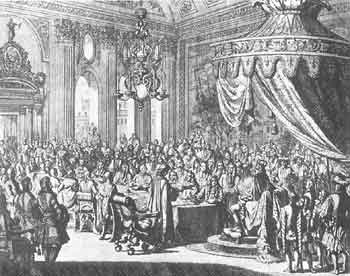The Edict of Nantes, established in April of 1598, was a declaration of King Henry IV of France that allowed Huguenots to live freely in France. This was significant both for religious and political reasons. By becoming religiously tolerant of Protestantism, France became yet another refuge for non-Catholics. At the same time, it became a battleground for new Huguenot ideas and traditional Catholicism. Politically, the French government became more distinguished from Rome, that is Catholicism. By being legally tolerant of Protestantism, it made a statement both about Rome as well as the new religious ideas popping up over the rest of Europe.
15 October, 2014
Edict of Nantes 1598
The Edict of Nantes, established in April of 1598, was a declaration of King Henry IV of France that allowed Huguenots to live freely in France. This was significant both for religious and political reasons. By becoming religiously tolerant of Protestantism, France became yet another refuge for non-Catholics. At the same time, it became a battleground for new Huguenot ideas and traditional Catholicism. Politically, the French government became more distinguished from Rome, that is Catholicism. By being legally tolerant of Protestantism, it made a statement both about Rome as well as the new religious ideas popping up over the rest of Europe.
Subscribe to:
Post Comments (Atom)

No comments:
Post a Comment